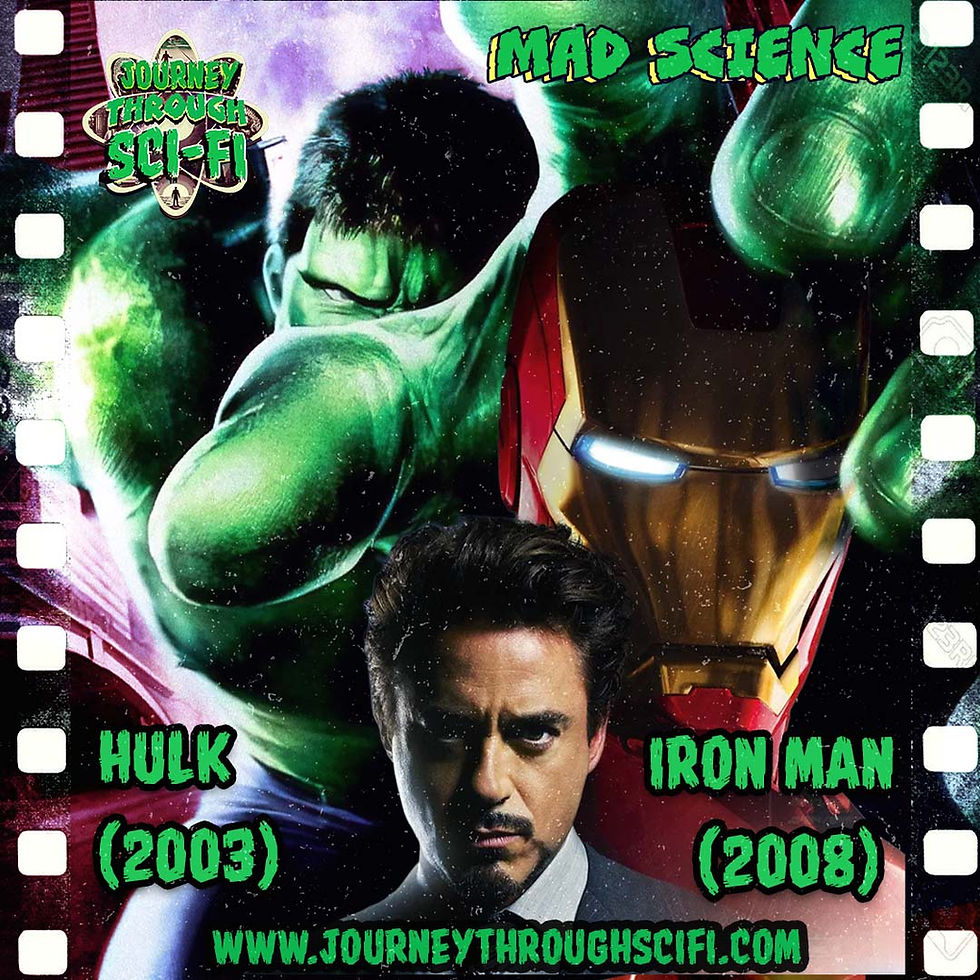Rockstar Scientists & Stolen Dreams - Buckaroo Banzai (1984) & The City of Lost Children (1995)
- Nov 20, 2025
- 3 min read
Genius, chaos, and cinematic weirdness collide as Matt and James explore two of the strangest visions of mad science ever put to screen — The Adventures of Buckaroo Banzai Across the 8th Dimension (1984) and The City of Lost Children (1995). From rock ’n’ roll brain surgeons to dream-stealing scientists, this double bill dives into the eccentric, the surreal, and the gloriously over-designed worlds of 80s and 90s sci-fi. Expect talk of comic-book logic, baroque laboratories, and how imagination itself becomes the ultimate experiment.
“Some scientists break the laws of nature. These ones break the laws of cinema.”

Episode highlights
Pulp science: How Buckaroo Banzai mashes up comics, kung fu, and quantum physics.
Rock-star scientist: Peter Weller’s coolest brain surgeon in film history.
John Lithgow unleashed: Dr. Lizardo and the art of overacting as mad genius.
World-building excess: The joy of movies that assume you’re already in on the joke.
From camp to craftsmanship: How City of Lost Children turns science into surreal art.
Dreams for sale: The emotional cost of experimentation in Jeunet’s gothic world.
Children, clones, and creators: Mad science as metaphor for artistic obsession.
Visual invention: Comparing Hollywood pulp to French fantastique.
Shared DNA: Why both films celebrate weirdness as a kind of intellectual freedom.
Chapter markers / timestamps
00:00:00 Cold open: snippets from both films’ wildest lines.
00:00:37 Welcome & setup — science goes surreal.
00:02:20 Buckaroo Banzai — pulp premise and chaotic genius.
00:06:04 The perfect B-movie cast: Peter Weller, John Lithgow, Jeff Goldblum.
00:10:22 Tone & texture — parody, sincerity, and 80s world-building.
00:15:18 The 8th Dimension explained (sort of).
00:20:40 Why it flopped — marketing an in-joke to the masses.
00:26:24 Transition to The City of Lost Children.
00:27:50 Jeunet & Caro’s visual world — steampunk nightmares.
00:31:12 The mad scientist archetype — Krank and his quest to dream.
00:36:48 Dream theft & emotion extraction as pseudo-science.
00:42:00 From absurd to poetic — balancing tone in surreal sci-fi.
00:47:26 Performance highlights: Ron Perlman, Dominique Pinon, Judith Vittet.
00:52:40 Comparing styles: chaos vs craft.
00:58:50 Final reflections — why weird science matters.
01:03:10 Outro & next-time tease.
Note: Timecodes approximate to final episode cut; minor drift possible.
Show notes & references mentioned
Films & TV
The Adventures of Buckaroo Banzai Across the 8th Dimension (1984)
The City of Lost Children (1995)
Delicatessen (1991)
Brazil (1985)
The Fifth Element (1997)
Doctor Who (1963– )
The Rocky Horror Picture Show (1975)
Flash Gordon (1980)
People & concepts
Jean-Pierre Jeunet, Marc Caro, Peter Weller, John Lithgow, Ron Perlman, Dominique Pinon
Pulp comics, surrealism, and the aesthetics of over-design
Mad science as creative rebellion
Pull quotes (for social / callouts)
“Buckaroo Banzai is what happens when pulp fiction takes acid.”
“Dreams, brains, clones — The City of Lost Children has it all bottled in one surreal lab.”
“Science fiction should be weird. These films prove why.”
“Both movies treat imagination as the ultimate experiment.”
“Lithgow’s mad scientist deserves his own Nobel Prize for overacting.”
Listener links
Subscribe & follow: Search Journey Through Sci-Fi on your podcast app.
Patreon: patreon.com/journeythroughscifi
Website: journeythroughscifi.com
Reddit: r/ThroughSciFi
Socials: @journeythroughscifi
Credits
Hosts: Matt & James
Series: Mad Science
Episode: The Adventures of Buckaroo Banzai (1984) & The City of Lost Children (1995)
Produced by: Journey Through Sci-Fi
Next time
We look at The Nutty Professor (1963) and Flubber (1997) — experiments in comedy, ego, and elasticity.




Back in the day, I was pretty pumped for “Buckaroo Banzai.” I’d gone to a sci-fi convention earlier in the year where a booth was handing out all manner of Team Banzai swag. I’d been reading a lot of pulp fiction, notably Doc Savage. (I think that polymath Doc and his team of experts “The Fabulous Five” were more of an inspiration than the likes of Flash Gordon.)
The film was unceremoniously dumped into U.S. theaters in mid-August, a sign that the distributor lacked confidence in its prospects. And indeed, my friend and I were just about the only ones at our screening.
“Buckaroo” was a movie that, like “Sky Captain,” played straight into my interests. Unlike “Sky Captain,” however,…